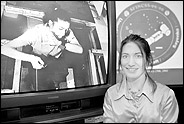Tales from the fishbowl
The vast frontiers of outer space have held an allure for Judith Lapierre since she was a little girl. Spending more than three months in a cramped space with seven others must have made all that room beyond earth's atmosphere seem even more attractive to her.
 Judith Lapierre, in person and on video from a now infamous Russian experiment
Judith Lapierre, in person and on video from a now infamous Russian experimentPHOTO: Andrew Dobrowolskyj |
|
"I'll never look at my nephew's fishbowl in the same way. I'm much more empathetic for the fish," Lapierre joked at a recent talk at McGill.
Lapierre, a professor of nursing at the Université du Québec à Hull, was the only woman, and the only Canadian, in an international crew of eight that shared two claustrophobic modules for 110 days. Called SFINCSS-99 (Simulation of Flight of International Crew on Space Station), the experiment was conducted by the Russian Institute for the Study of Biomedical Problems to simulate conditions for multinational crews that will serve on the International Space Station.
Lapierre, an astronaut hopeful, was excited at the opportunity to participate in the study. Outside space research circles, the experiment was relatively unknown until January of last year, when a particular incident put Lapierre on the front pages of newspapers from coast to coast.
During a party celebrating New Year's Eve, Lapierre was pulled out of view of the module's observation cameras and forcibly kissed by a Russian crewmate. The incident received wide press coverage last year when Lapierre complained, but the Russian organizers of the experiment denied that the incident was important.
"I don't want to sensationalize this," said Lapierre, "[but] we have to look into this, and downplaying and covering up is not helpful."
Lapierre pointed out that cultural and personality differences can have important effects on the success of a space mission. She was given the chance to leave the experiment, as one of her Japanese colleagues did, but elected to stay. Because she was involved with 80 experiments already underway and because she believed she hadn't done anything wrong, she decided to stay put.
Lapierre said that the problems she encountered should make the agencies responsible for the International Space Station change how they select their astronauts and define their objectives. Astronauts sharing tight quarters on long space missions have enough to worry about without having to fret about the kind of culturally inappropriate behaviour -- if not outright sexual harassment -- that Lapierre was subjected to.
"What is a mission success -- to complete the task, or to get along with the ones you're working with?" she asked.
Despite the serious nature of the New Year's incident, she remains enthusiastic about space travel, and found some moments of levity during her months in the cylinder.
As a slide bearing the message "We are not alone" lit the screen behind her, Lapierre told another anecdote that demonstrated the difficulties of international cooperation in space.
She had noticed that her head had been itchy for some time, but didn't think anything of it until a crew member complained of the same problem. Lapierre, who is trained as a nurse, discovered that they both suffered from head lice.
"We kind of panicked and we called mission control. The Russians didn't know anything about head lice, so I called home and CSA (Canadian Space Agency) sent a special delivery (of medicine) the next day," she said to laughter.
Despite the New Year's incident, Lapierre had kind words for many of her crewmates. Each crew member was allowed 10 minutes each week to call home. Two of the Russian crew members would often give her their phone ration, meaning she could talk to her husband for up to half an hour. Another gave her a tape of French music, which she appreciated very much.
Lapierre's talk was organized by the Association for the Development of Aerospace Medicine.

